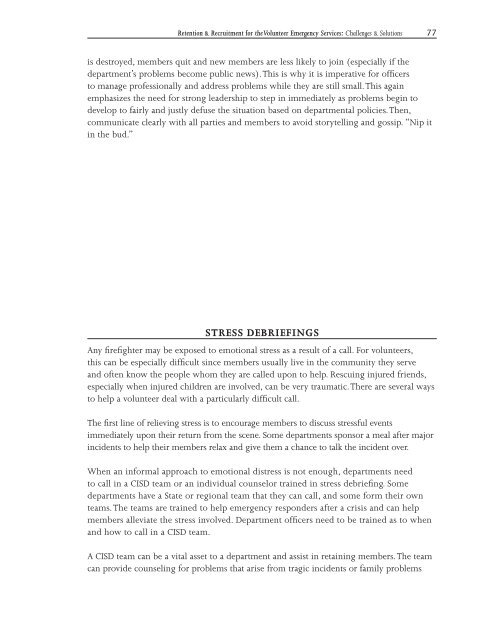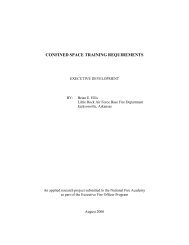Retention and Recruitment for the Volunteer Emergency Services
Retention and Recruitment for the Volunteer Emergency Services
Retention and Recruitment for the Volunteer Emergency Services
Create successful ePaper yourself
Turn your PDF publications into a flip-book with our unique Google optimized e-Paper software.
<strong>Retention</strong> & <strong>Recruitment</strong> <strong>for</strong> <strong>the</strong> <strong>Volunteer</strong> <strong>Emergency</strong> <strong>Services</strong>: Challenges & Solutions 77<br />
is destroyed, members quit <strong>and</strong> new members are less likely to join (especially if <strong>the</strong><br />
department’s problems become public news). This is why it is imperative <strong>for</strong> officers<br />
to manage professionally <strong>and</strong> address problems while <strong>the</strong>y are still small. This again<br />
emphasizes <strong>the</strong> need <strong>for</strong> strong leadership to step in immediately as problems begin to<br />
develop to fairly <strong>and</strong> justly defuse <strong>the</strong> situation based on departmental policies. Then,<br />
communicate clearly with all parties <strong>and</strong> members to avoid storytelling <strong>and</strong> gossip. “Nip it<br />
in <strong>the</strong> bud.”<br />
stress debriefings<br />
Any firefighter may be exposed to emotional stress as a result of a call. For volunteers,<br />
this can be especially difficult since members usually live in <strong>the</strong> community <strong>the</strong>y serve<br />
<strong>and</strong> often know <strong>the</strong> people whom <strong>the</strong>y are called upon to help. Rescuing injured friends,<br />
especially when injured children are involved, can be very traumatic. There are several ways<br />
to help a volunteer deal with a particularly difficult call.<br />
The first line of relieving stress is to encourage members to discuss stressful events<br />
immediately upon <strong>the</strong>ir return from <strong>the</strong> scene. Some departments sponsor a meal after major<br />
incidents to help <strong>the</strong>ir members relax <strong>and</strong> give <strong>the</strong>m a chance to talk <strong>the</strong> incident over.<br />
When an in<strong>for</strong>mal approach to emotional distress is not enough, departments need<br />
to call in a CISD team or an individual counselor trained in stress debriefing. Some<br />
departments have a State or regional team that <strong>the</strong>y can call, <strong>and</strong> some <strong>for</strong>m <strong>the</strong>ir own<br />
teams. The teams are trained to help emergency responders after a crisis <strong>and</strong> can help<br />
members alleviate <strong>the</strong> stress involved. Department officers need to be trained as to when<br />
<strong>and</strong> how to call in a CISD team.<br />
A CISD team can be a vital asset to a department <strong>and</strong> assist in retaining members. The team<br />
can provide counseling <strong>for</strong> problems that arise from tragic incidents or family problems

















